Mi3's all-time top stories of 2023: Corporate conscious uncouplings and PwC, Ehrenberg-Bass 'dogma', CDP benders, Tourism Australia rules, marketing effectiveness reigns and agency models monstered

Like Mi3’s top Marketing stories for 2023, marketing and advertising effectiveness ruled the heatmap in our overall biggest stories for the year. But there’s a new wave of surging industry interest in customer tech – customer data platforms, martech stacks and decisioning engines have been notable areas of rising interest from marketers and the agency sector this year. Plus a little corporate intrigue went a long way when Thinkerbell split with PwC and its stake in the agency after the big audit and advisory firm’s tax scandal. There was also much intrigue around the broadcaster v streamer street fight and Australian adland’s biggest export – Accenture Song’s Global CEO, David Droga.
30.
We are in the very early moments of the journey...we’ve seen a 30 per cent uplift in our customer response rates

Lisa Dickson, Head of Marketing Automation, BUPA shares the early success metrics. Content management the next big focus
'30% uplift in customer response rates': BUPA's AI-powered decision engine delivering huge early NPS scores, $12m incremental revenue gains, $1m in cost out
The health insurance giant BUPA is landing strong early returns from a new round of investments in machine-led real time decisioning, and the kinds of NPS scores most brands dream of.
29.
Retailers think about the next quarter, or half and not next financial year and beyond.

Amazon says it is now selling 200 million products on its Australian shopping site.
Amazon Australia cracks $100m in ad sales, $3bn from online store, $250m in Amazon Prime subscriptions; Total sales hit $2.6bn but posts loss of $1.5m
Amazon's Australian ad business cracked $100m last year, up 63 per cent on 2021 as net sales from its online store broke through the billion dollar barrier for the first time, growing 46 per cent for the calendar year to $1.3bn. The online juggernaut says it now has 200 million products listed locally. Amazon Prime's streaming and delivery subscription service delivered $250m in revenues, up 58 per cent on 2021 but it was third-party reseller services - where brands use Amazon's vast distribution and fulfilment infrastructure to sell and deliver products sold online - which was the fastest growing unit. It surged 75 per cent to $316m.
28.
Burying yourself in the bullshit of ad tech, I suddenly realised what we did isn't media buying at all. You are putting instructions into a piece of adtech in order that an algorithm will then make a decision as to where and when your ad turns up – and the scale of media buying is redundant.

Even a shrink couldn’t fix media agencies’ narrow mindset: Why Dave Gaines ditched GroupM to build Media by Mother, takes no mark-ups on media buying – 'just data entry' – KPIs staff on learning, plots Apac launch
After two decades at GroupM, Dave Gaines quit to launch Media by Mother, an offshoot of London creative hot shop Mother that he only half jokes may ultimately subsume its progeny. A major frustration with US holdcos, per Gaines, was the inability for swathes of their people to think laterally, critically and stay curious. He hired a shrink to try and fix the problem, and then tried to take a creative-agency led approach to media within WPP. Ultimately, neither worked. Now Media by Mother staff – many arts grads – are KPI’d to read, listen and learn outside of their remits to better grasp the bigger picture. If they do, they get up to 15 per cent more salary. If they don’t, “there are plenty of other places they can work.”
27.
Coles and Woolworths could dominate the entire ad market if they wanted to.

Retailer media eyes 50-100% growth in 2023: Nestlé, Pepsico, Lion, Moccona, Steggles, v2food on where the money’s moving and what’s stopping the floodgates – 74 page deep dive report
“The reality is that legacy media has yet to wake up to the competitive threat from retail media. They’re attributing it to almost everything but the real cause of softness and stagnancy in the marketplace,” says Media Village analyst Jack Myers. If the US is a marker for Australia, TV, search, social and out-of-home could face significant disruption – with knock-on effects for marketers and agencies – as retailers start to scale. But FMCG brands say taking the big money will require big upgrades in data, measurement and rigour. Get the download via Mi3's new 74 page special report.
26.
We’d been losing share at a rapid rate. We had more nimble players coming into the market with really good digital propositions. We’ve been slow to catch up, that’s what we’re now trying to do – and in the last year we’ve stemmed the bleed. Now we want to leapfrog the competition.

Tabcorp customer chief, Jenni Barnett: "We've played catch up. But [now] we want to leapfrog the competition. It comes down to customer experience, leading through that and creating differentiation.”
Tabcorp customer chief Jenni Barnett stems digital haemorrhage to snappier rivals; bins bad media deals, restructures teams, now gunning for 10x conversion via ‘contextual personalisation’
Since leaving Telstra to take on a wide-ranging c-suite role at Tabcorp – spanning product, data and data science, customer experience and personalisation, brand, marketing and sponsorship with revenue responsibility – Chief Customer Officer Jenni Barnett has hit the turf running. The betting firm was haemorrhaging customers and share to digitally-savvier, free-spending rivals like Sportsbet and Ladbrokes.
25.
There’s a huge opportunity for me in a different type of industry, lateral growth and being part of a really tight executive team. And to be quite frank, in a business that, well, everyone knows needs to change.

Seven marketing and audience chief Mel Hopkins: Brand investment can turn TV's audience fortunes around and drive earnings growth – but there's a transformation job ahead to see off the streamers.
Why Mel Hopkins left Optus for Seven CMO gig: Not putting 'lipstick on a pig’; Big transformation plan looms – sharpening marketing, hitching it to the P&L – and her take on the Optus cyber attack
Mel Hopkins says she hasn’t gone to Seven “to put lipstick on a pig”. The former Optus CMO says CEO James Warburton wants “total transformation” and she’s hatched a four-point plan, which includes linking Seven’s marketing activity and investment directly to earnings and the P&L “in real time”. Anything less, she says, “and I am failing to do my job”.
24.
A lot of tech has turned up and a lot of it is point solutions. They are really struggling to deliver value from that, because there aren't the skills internally, there's a lack of integration, a lot of technology silos between all those things.

Martech shakeup: LendLease and Sydney Opera House latest in a broad corporate rationalisation of marketing and customer technology investments.
Opera House, Lendlease latest to cut martech spend; Adobe, Salesforce, Sitecore displaced by challengers Canva, Hubspot, Optimizely, Acquia as big cost-driven consolidations begin
The Sydney Opera House and Lendlease have jettisoned their tier one martech platforms – Adobe, Salesforce and Sitecore – the latter two in the Lendlease stable – as they look to bank significant savings from martech rationalisation. Both projects are comprehensive in scope. Lendlease for instance is moving to Hubspot from Salesforce for core marketing cloud and customer relationship management (CRM) capabilities, to Optimizely from Sitecore for its digital experience platform which is designed to deliver personalised customer experiences and to Canva from Adobe for its content creation needs. And both deals are part of broader trend Forrester Research says could see corporates shed a third of their “tactical revenue stack solutions” this year.
23.
The Marketing Academy enabled me to open my eyes, expand my horizons and build my leadership capability to step up from CMO to CEO.

The Marketing Academy's new scholars for 2023
Top guns: The Marketing Academy Australia picks 30 execs to hone next marketing, media, agency leaders
Way back in March The Marketing Academy Australia announced its 2023 intake. The highly selective scholarship program is designed to equip the next generation of top talent across marketing, media and agencies to become business and industry leaders. It includes mentoring from CMOs at ANZ, Commbank, NAB, Pernod Ricard, Lion, Telstra, Tourism Australia and Hipages. Here's the list.
22.
This particular defamatory ad...illustrates why the companies collecting these ad dollars should play a more active role in preventing scam ads.

Eddie McGuire targeted with more than 200 fake ads on Facebook, Instagram and Twitter; Nine slams 'defamatory ads' and 'passive' platforms letting fraud flourish
Social media companies are under fire to take tougher action against fraudsters after more than 200 fake ads depicting Eddie McGuire being arrested and flogging bitcoin have circulated on Facebook, Instagram and Twitter for the last two weeks. Nine argues the ads are defamatory and damaging to the Millionaire Hot Seat host, and has called on platforms to take firmer action to vet and prevent fraudulent ads from being posted. Facebook is investigating and said it uses tech to identify fake ads, but this process is imperfect and often it relies on users to pick up scams.
21.
These banks are going to spend three, five, eight million a year, every year for the next five, seven or ten years. I've talked to banks that have been getting half a billion dollars in return. Huge, but it's massive investment.

Pete Avery, Liz Miller and Rusty Warner on why real time decisioning is winning favour in banking and finance.
Huge returns, but huge investments: Why Commbank, Suncorp, NAB, BUPA and more are betting on real time decisioning engines; marketing clouds can't compete, for now
A select cadre of Australia's banking, insurance and telco brands including Commbank, NAB, Suncorp, BUPA and Optus are spending millions each year on real time decisioning. The pay off can be massive. Forrester's Rusty Warner says some firms are realising half a billion dollar returns by boosting customer lifetime value over and above increasing transactions and revenue. But he thinks selling to CMOs could be a mistake.
20.
Remote work is a fucking disaster for young men. Where do they find mentors? Where do they meet mates? I worry that we're going to have an entire generation of men who never get to an office, who weren't socialised correctly and enter into these low calorie, low risk relationships with AI girlfriends and sex dolls and never have kids.

Professor Scott Galloway: "I think the CMO is a little bit like having someone called chief electricity officer."
Scott Galloway: Why CMOs are ‘dead in 18 months’, work from home is a ‘fucking disaster’ for young men, which jobs will be usurped by AI – and why you shouldn’t worry about it too much
Professor Scott Galloway thinks 'traditional' CMOs are heading for the great gig in the sky. The only ones left standing will be those knee deep in the "boring shit" of supply chain, product and analytics he keynoted at ADMA's Global Forum in Auguest. He's also bleak on the prospects of mid-weight graphic designers, social media managers and programmers as AI renders them obsolete. Longer term, AI will create more jobs than it takes, per the NYU professor of marketing. But in the short term, brace for the full impact of disruption. Galloway is also deeply concerned about the effects of work from home, particularly on young men: no mentors, no social skills, maybe no families of their own as a result. "Between porn and AI, are men ever going to leave the house? I fear we are raising a lost generation."
19.
A CDP will help us to understand high value customers and how they’re shopping across our brands.

‘The whole economy is on a CDP bender’: NAB next to move, picks Tealium over Salesforce, Adobe; retailers, marketplaces piling in
Demand for CDPs – customer data platforms – is running hot, has been all year and will likely get hotter as businesses grasp the full implications of the government's sweeping privacy reforms. In February NAB was the latest tto ink a deal, choosing Tealium ahead of incumbent martech providers Adobe and Salesforce. Experience provider Big Red Group was also making a CDP central to its major stack overhaul while Mosaic and Alquemie, owners of retail brands such as Surf Stitch, General Pants, National Geographic and Pumpkin Patch, say the tech is central to its growth ambitions - and to navigate a "very fragile" retail outlook this year.
18.
One of the things that overwhelmingly comes through with younger people is they say they want remote working and flexibility - tick, we give that to them. And then interestingly…they say they feel a lack of engagement and connection with the company. I and my colleagues actually say okay, cool, well then come into an office.”

Mat Baxter: "Did the pendulum swing too far too quickly on remote working after Covid? I think the answer is yes. Were we one of the companies that did that? The answer is yes."
‘We swung too far’: IPG’s Mat Baxter returns to Australia to run Huge globally as remote working proves an experiment in lost culture, capability and connection - next gen not ‘joining the dots’
After nine years in New York, the perpetually provocative expat and former global CEO of Initiative Media, Mat Baxter, now running IPG’s experience, tech and design firm Huge, returned permanently to Sydney in August to run the global operation that went fully remote – until Baxter realised it wasn’t entirely working. Now he’s bringing back office life, sort of.
17.
Our forecast for the total ad market is flat for this year if we don’t go into a recession but linear TV will be around minus 10 per cent. That is around $300m.

Source: Pearman FTA Television and Streaming Services report, December 2022. Quarter Hour Audience Peak Night, Adults 18+. Excludes SBS. Pic: Image - Lauren Martin
‘Biggest audience decline in history of TV’: Nine bundles media assets to snag $305m, eight-year Olympics deal as $300m set to exit linear TV ad market this year
In what has turned out to be an early, razor sharp forecast for linear TV's fortunes this year, Australia’s biggest media buyer Omnicom Media Group (OMG) warned in February $300m was set to vanish from the linear TV ad market this year after a horror 2022 for audience declines. Circa 20 per cent of free-to-air viewers in primetime last year went elsewhere in what Pearman Media’s Steve Allen described as “the biggest audience decline in the history of TV”.
16.
We’re not immune to the macro-economic situation that we all currently live in and we do need to address this so we're coming out the other side stronger
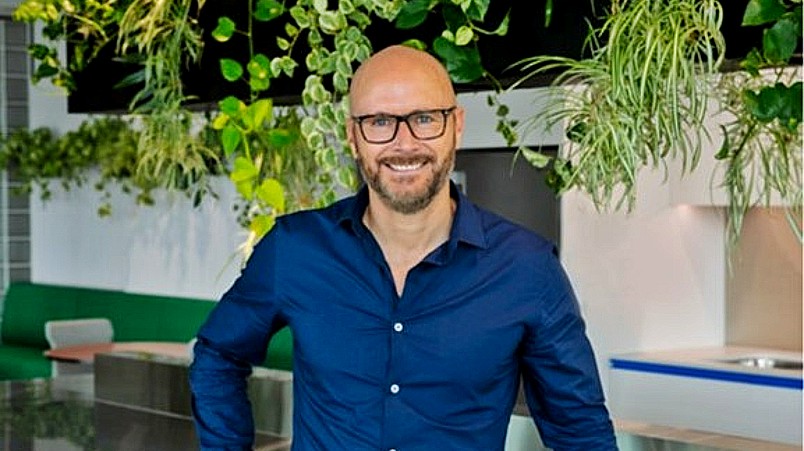
Patricio De Matteis: “Like many other businesses, we’re not immune to the macro-economic situation that we all currently live in and we do need to address this so we're coming out the other side stronger"
Shakeout: Dentsu makes dozens of staff redundant; blames tough macros
Dozens of staff have left Dentsu in recent weeks as the holding group cuts costs. Although Dentsu would not confirm the total number or individual names, Mi3 understands it is at least 40 people across all parts of its business. In the past few years Dentsu, under previous boss Angela Tangas, has made dozens of executives redundant as it embarked on a business transformation reducing its number of agency brands from 25 to five in this market. Current Dentsu ANZ CEO Patricio De Matteis said the latest round of job losses are due to macro-economic conditions.
15.
We're seeing a greater impact and conversion of our leads and demand generation activity, because we have always-on brand campaigns supported by thought leadership.

LinkedIn's Amy Mills, Forrester Researcher's Daryl Wright, Autodesk's Ljubica Radoicic and Green Hat's Joel Thomson on brand challenges facing B2B marketers
B2B bust-up: Third of B2B marketing budgets globally now spent on brand, says LinkedIn study, but Australian sales teams rule roost on performance marketing warn marketers, agencies
When it comes to investing in brand, Australia's B2B marketers know they are doing the wrong thing by over-investing in performance and demand generation marketing. Sales voices shout them down each time and B2B marketers lack the internal clout to fight back. It's an especially acute problem in the technology sector and for subsidiaries of international brands. B2B marketers know they need to prime 95 per cent of their prospects and customers who are not in market to buy at any given time for when they do become active – and to be in the consideration set for B2B buyers that are often 70 to 80 per cent along their purchase decision journey before vendors even know they are in the market. Now a new global B2B marketing study by LinkedIn demonstrates how important brand is to B2B marketing around the world.
14.
I appreciate that people might [think], we're more contemporary than [a CGI kangaroo] … but we don’t have enough budget for people to mistake us for another destination.

Unmistakably Australia: Susan Coghill and Mark Ritson on why Ruby the kangaroo is moving the marketing effectiveness needle, building brand and demand – and confounding critics – for years to come.
Let the marketing effectiveness rulebook do the talking: Tourism Australia CMO Susan Coghill and Mark Ritson on why Say G’Day’s success has silenced doubters – and will keep rolling for years
The naysayers scoffed when Tourism Australia made a CGI kangaroo and 1984’s Say G’Day tagline the main roll of a $125m tax-funded bet to bring the world back to Australia after three years of fire and plague. One year on, those “doofuses” are eating their words, per Mark Ritson, as the kangaroo eliminates misattribution, boosts consideration 18 per cent, delivers travellers in droves, primes high spending tourists to plan trips for next year and beyond, and remains at the very top end of System1’s effectiveness league table. Funnily enough, say Ritson and Tourism Australia CMO, Susan Coghill, following the marketing effectiveness playbook actually works – and the armchair critics were never the intended target. While Tourism Australia is now heading into a statutory review of its creative agency roster, don’t expect much to change – which means more budget to keep hammering the message home, building brand and delivering demand. Ritson reckons it could run for 20 years without wear out. Coghill’s planning for at least four. Here’s how Coghill did her homework, sold it in to stakeholders, went to market and how it’s tracking – and why, per Ritson, 20-30 per cent of marketers will never make the top grade if they cannot get comfortable with imperfect marketing datasets.
13.
The biggest compliance costs will fall on those making the most money out of loyalty data … those with the biggest databases that they're trying to convert into media channels – their business proposition is based on getting data and permission. They didn’t need permission before, now they do.

People power: "This is a sweeping set of changes that need to be taken seriously. Every company that has a relationship with customers...that collects and manages people’s data will soon experience a new set of rules," says REA's Josh Slighting.
‘Data is the new asbestos’: Privacy reforms pit ‘underwhelmed’ consumer advocates with industry preparing for ‘radical change’, heavy data compliance burden; Geo location, ad targeting, data trading face new consent rules
Seismic change? Here's Mi3’s first sweep of responses to the Federal Attorney General’s drop in February of a 300-page document outlining the biggest overhaul to Australia’s privacy regime in two decades. The marketing, tech and media sectors are broadly bracing for fundamental change to how they do digital marketing, advertising, targeting and personal data collection. Firms will need to explain in the language of a person with “below average intelligence” how their data is being used. If not, they can't use it. Industry will also have to deal with an “unqualified right” for individuals to opt out.
12.
We respect his decision to step down from the CMO role due to family commitments, and the ongoing toll traveling between his home in Sydney and Domino’s HQ in Brisbane was taking, and wish him every success in the future.

L-R: Domino's CMO Adam Ballesty quits, Allan Collins returns as Australia's biggest pizza chain faces new customer and competitor pressures.
Reheated: Domino’s CMO Adam Ballesty quits, former marketing boss Allan Collins returns as sales slow, investors crunch share price $9bn in 18 months; Maccas, KFC dominate
After designing a “more for more” consumer marketing program to counter rising raw material costs and appointing start-up agency It’s Friday to handle the retailer’s creative business, Domino's Australian CMO Adam Ballesty has exited the Brisbane-based global pizza chain and one-time stock market darling after joining the group 2021. Last week Domino’s share price dived by nearly a quarter to $54.37 after it warned sales and home delivery orders were slowing and pre-tax profits were down 30.6 per cent for the December half across the global network. Although European and Asian sales were hit harder than Australia, the stock slide continued to $49.96 yesterday, valuing the once hot quick service restaurant at $4.45bn. During Covid, sales roared along with a $12bn-plus market cap – yesterday it was trading at a third of its value compared to September 2021.
11.
They claim to be scientists at Ehrenberg-Bass – but there's a whiff of aftershave behind the white coat; commercial driving intent.
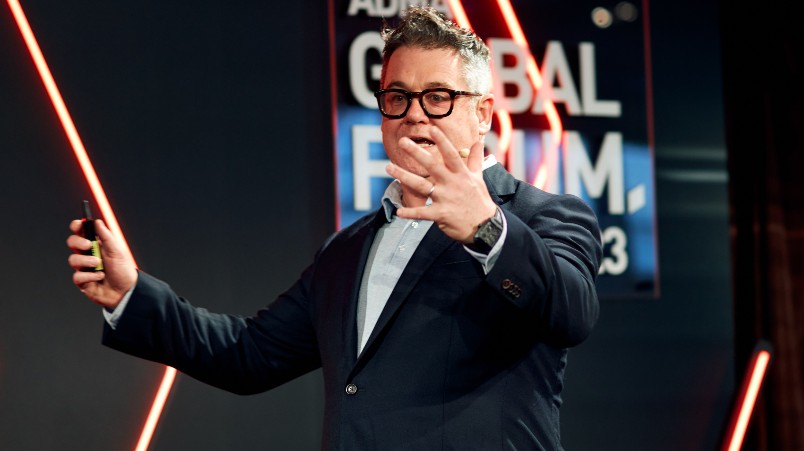
Mark Ritson: "It’s not an impossible mission. You don’t need to trade off differentiation and distinctiveness. You can have both – and you need both – to be successful."
‘Don't call it science, call it what it really is: consulting, dogma, ideology’: Mark Ritson on why Ehrenberg-Bass has distinctiveness v differentiation wrong – and how brands grow better with both
Distinctiveness versus differentiation is a stupid fight, per Mark Ritson in a typical feisty session at ADMA's Global Forum in August. Brands need both to grow faster – and he thinks Ehrenberg-Bass has it wrong in picking the former over the latter. To get it right, the virtual professor says marketers must change their approach to positioning – and massively strip it back. “It is the biggest action item I would recommend that you follow. Get rid of your complexity ... It’s making your brand less and less clear.” Pick one concept, two or three key brand attributes, then go to market with a simple, clear message – and hammer it for years as broadly as possible. Tourism Australia CMO Susan Coghill, says Ritson, “knows what the fuck she is doing.”
10.
I joke that in my new role, a third of the conversations I don't understand what's being said, a third of the conversations I don't know why we're having the conversations, and a third of the conversation I'm blown away that we're having a conversation. So my primary role is to interpret the first third, get rid of the second third, and just focus on the final third
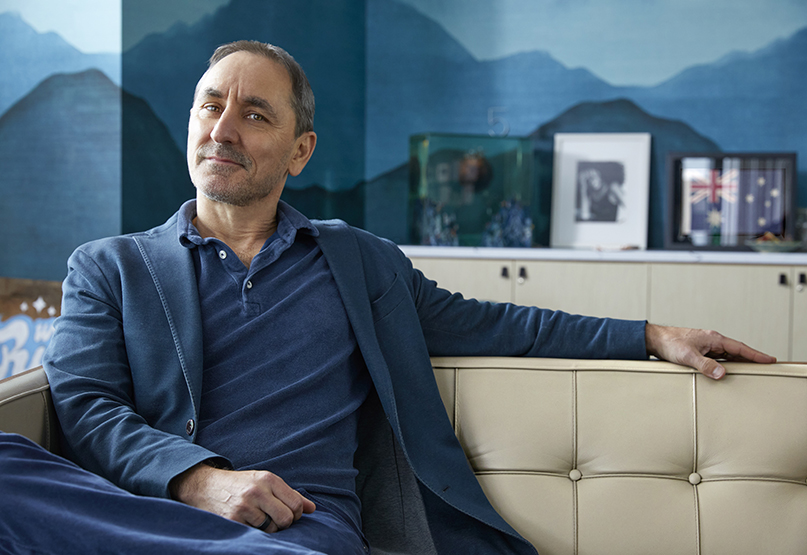
David Droga: "I know that I've done a really great job, because C-Suites need more creative people in there. You want to bring the best and brightest to solve for where you're going." Pic: Accenture Song
Accenture Song chief David Droga on what business leaders want, when he can understand what they're talking about; Gen AI’s looming impact, The Monkeys losing Telstra; The Voice – and three words he’d tell his 18 year-old-self
Accenture Song chief David Droga runs the creative and digital powerhouse at the heart of a professional services giant employing 700,000 people in 120 countries. The founder of Droga5 and brains behind some of the world's most iconic advertising campaigns, including the Tourism Australia Dundee spoof, admits he is still learning about the power of tech, data and creative. He thinks the nation's creative brilliance is not being sold as well as Tourism Australia campaigns – such as the current Say G'Day and Droga5's iconic Dundee work. He also reckons there is too much short-termism and a relentless focus on "fireworks" and the creative industry needs to balance this out with more "lighthouse" campaigns that CEOs and CMOs require. There are few people better positioned to run the rule over the advertising industry, and Droga doesn't pull any punches. He wants quality and evolution, and maybe one day, to become Australia's next PM.
9.
CRM had unfortunately become just very disjointed. It was a very poor experience for internal business units.

Everybody hurts: "It actually was really painful in the end for everybody," says Marc van den Berg, Global Head of IT Development & Innovation at Lendlease. So it went full stackageddon with a major martech consolidation – in seven months.
Rip and replace: All the winners and losers from Lendlease's massive martech consolidation; total cost of ownership slashed 78 per cent; few functional sacrifices in Salesforce-Hubspot swop
Massive martech licensing cost reductions have seen Lendlease slash total cost of ownership of its stack by almost 80 percent within months. As Mi3 reported earlier this year, the multinational developer abandoned Salesforce after a decade's worth of collaboration, replacing it with Hubspot. New details have come to light after a presentation in the US by a key executive. Overall, it cut the number of providers from 20 to just five, and only two incumbents, DocuSign and Stripe survived 'stackageddon'. The timeframe was equally impressive – the project was delivered in seven months, a schedule the implementation partner described as 'insane'. But Lendlease's Marc van den Berg, Global Head of IT Development & Innovation, attributed success to that truncated timetable and a brutally honest acceptance of the state of play. Per van den Berg, it was better to just rip the band aid off technology debt that had become "really painful" for the business.
8.
Digital engagement across our group websites and apps has continued to grow strongly.
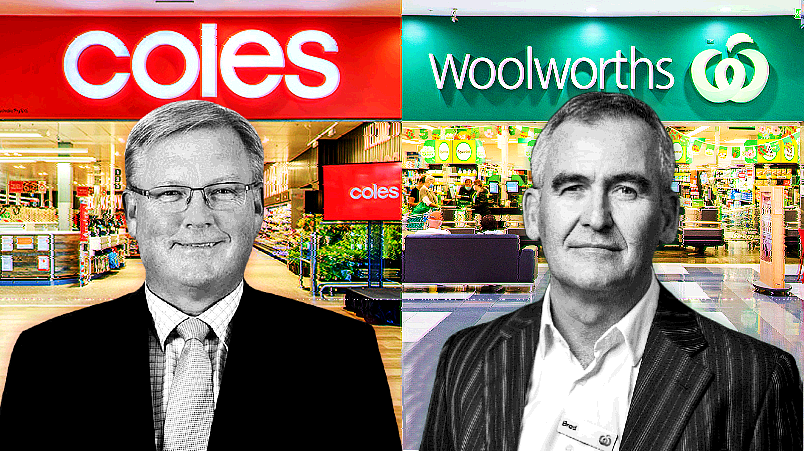
Coles versus Woolies: ecom drops as shoppers hit the streets, Brad Banducci says decline faster than predicted; customer fulfilment overhaul ‘really painful’
By March this year, consumers were once again wearing out the shoe leather and returning to stores to stock up on the weekly grocery shop. As a result ecommerce sales were down even as digital engagement increased. And the complexity of creating new fulfilment and delivery models was causing management headaches and construction delays for Australia's two giant grocers.
7.
If you're an agency and you sell 100 [head] hours today, you might only be able to sell 80 hours tomorrow because AI removes 20 of those hours from the process. So now you've got a business that's got 20 per cent less potential from a monetisation standpoint.

Mat Baxter: "We're not doing the award thing. We're not shouting PR in our campaign work…clients think we're a bunch of idiots patting ourselves on the back with awards, talking about how many things we’re winning. We can be a bit more refined."
‘AI is a really big problem’: IPG’s Huge global CEO Mat Baxter drops agency model selling people for consulting sector’s products and templates, margins up - and no awards, less PR puff and posturing
Part two: Mat Baxter used to be a walking headline but he pledges less of it. He’s headlong into a sometimes ‘painful’ reinvention of his global tech, design, ‘creative growth’ and innovation business which unashamedly has swung to the big consulting firms over agencies for its future as AI takes an initial 20 per cent of the agency workload off humans. Baxter’s parent company IPG generates circa US$11bn in revenues, mostly from its agency networks selling their people on a head hours basis. But he says that’s a doomsday scenario thanks to a killer combo for agencies of AI-led automation and margin killing procurement teams.
6.
Thinkerbell has grown from a few people in a shared house to an agency of around 160 people in Melbourne, Sydney and New Zealand. It’s time to part ways and explore our next adventure

Taxing times: Ingram, Ferrier, Reid and Couzens have severed ownership ties with PwC
‘A corporate conscious uncoupling’ - Thinkerbell buys back PwC stake in wake of tax leaks scandal
Thinkerbell has bought back PwC Australia’s circa 10 per cent ownership stake weeks after the professional services firm was found to have misused confidential government tax information for commercial gain. The “Measured Magic” agency, where "marketing sciences meets hardcore creativity", said PwC’s investment has provided Thinkerbell “the opportunity to build a world-leading agency and drive growth through powerful, creative ideas”, but that it had decided to part ways in the wake of the PwC controversy.
5.
Meta will tell us one thing, Google will tell us something else, and Criteo Offsite will tell us something. But what we want is an aggregated, holistic view on what people were doing.

Simon Hilton, Lizzy Foo Kune, Cam Strachan, Ben Hoefel, Pippa Leary, Kent Len and Keelan Howard.
CDP investigation Part 1: ANZ market closes in on 500 sites; Jetstar, News Corp, SCA, Chemist Warehouse, Karbon and CIAA unpack business impact; Segment dominates with over 330 customers, Tealium strong in enterprise, Lexer in retail, Adobe on the rise
The CDP market in Australia is running red hot, with circa 500 companies now using customer data platforms or currently implementing. Segment dominates in volume terms with more than 330 customers, up from 50 just three years ago. But Tealium is capturing a big chunk of the loot thanks to its enterprise dominance. Together with Lexer (70-80 clients covering almost 110 brands) and Adobe, these four vendors have over 90 per cent of the installed base that Mi3 has identified. But it's the brand stories that really explain the appeal. The experience of Jetstar, Chemist Warehouse, News Corp, Moët & Chandon, SCA and a bunch of others suggest major marketing efficiency gains, strong customer growth, more effective advertising and the ability to save a packet by avoiding wastage. Plus better using all that first party data in an ad ecosystem in the middle of major structural upheaval.
4.
No-one’s ever been in this new green media pasture. They’ve got to make these things up. We found it very difficult to make contact with Netflix – and when we did they said you’ve got to have $500k.

Streaming bad: Netflix ad tier launch bombs; Foxtel’s Binge sells out for ad phase launch; Disney+ ads slated for mid-year
Netflix’s first foray into advertising has bombed with Australian take-up of its $6.99 "Basic with Ads" subscription package missing pre-launch projections by 50-70 per cent. Media agency holding groups, representing blue chip advertisers and brands, each outlayed $6m or more for 12 months access to new ad tier subscribers. Back of envelope calculations put subscriber numbers to Netflix’s ad tier package at 75,000-90,000 - it launched in November last year.
3.
Undermining that highly advantageous position we’ve reached together as a marketing community is perverse, and fuels a perception that Ehrenberg-Bass’ priority is not to support our profession in reaching a higher plane of understanding – it’s to confound us, to sow distrust, to win and to make sure others lose in the process, though they needn’t.

James Hurman (left): "Ehrenberg-Bass' 'we're more scientific than you' posturing is not useful at all."
It’s not enough merely to win – others must lose: Why the Ehrenberg-Bass Institute’s MO is destructive to the marketing profession
In July, the University of South Australia's influential Ehrenberg-Bass Institute (EBI) was back at it again – out in the world denouncing anything marketing effectiveness-related that hasn’t been produced by about 100 of its own marketing science researchers and academics. This time it was at the World Federation of Advertisers’ Forum Connect event in Singapore, following a similar spray at the B2B Next event in Sydney last year in which most advertising, media or marketing effectiveness thinking developed outside the EBI recieved brisk dismissal. Mi3 has decided to publish the full audio of last year's event alongside this piece, in which James Hurman says the EBI risks misleading its clients, soiling the legacy of its namesakes, and undermining marketing effectiveness.
2.
I said to the agency teams, 'listen, this is what we're doing. Find people in your organisation that naturally gravitate to this approach. I don't want anybody to start arguing about I don't know if Byron Sharp is right and I don't agree with James. We're past that, right or wrong.' And they all stepped up to the plate.
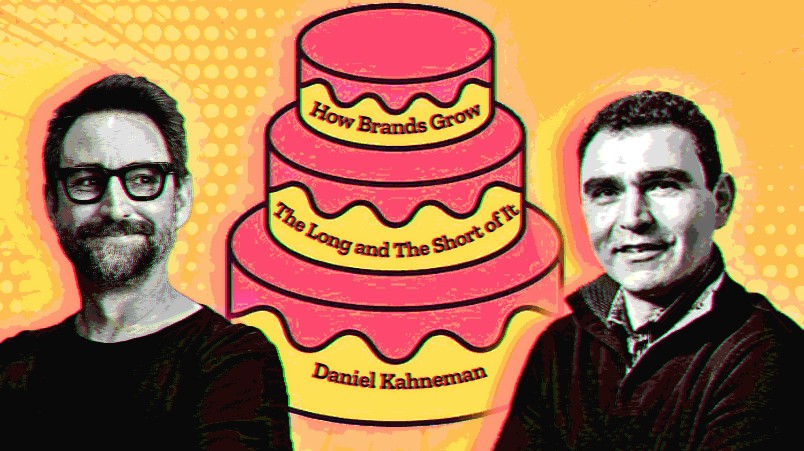
“It’s like baking a [marketing science] cake. Use all of the ingredients, it turns out brilliant. Leave any out, it's a mess.” James Hurman (left) and Douwe Bergsma are using every key marketing science ingredient – and watching KPIs rise nicely.
'Almost overwhelmed': How an ex-P&G US marketer ditched cohorts, personas, blended Ehrenberg-Bass, Binet & Field textbooks word for word, landed biggest marketing budget in $7bn company’s history – and all KPIs are powering
Douwe Bergsma was a veteran consumer goods marketer long frustrated with the light fodder served up at marketing industry conferences, and by big tech and the trade press. But he found enlightenment in the dense and dreary of marketing and behavioural science and advertising effectiveness studies. It’s not often Australia or New Zealand can teach the big US dogs new tricks but Bergsma’s agenda to reinvent healthcare and his $7bn organisation was a risky, and at the time, radical roll of the dice that spurned embracing everything new for the sake of it. The strategy and results so far are textbook stuff. Everything worked. KPIs are powering. Nobody is asking him any more hard questions, they just want more. Here's how it was done.
1.
AI is weird. No one actually knows the full range of capabilities of the most advanced Large Language Models, like GPT-4. No one really knows the best ways to use them or the conditions under which they fail. There is no instruction manual. On some tasks, AI is immensely powerful, and on others, it fails completely or subtly. And, unless you use AI a lot, you won’t know which is which.
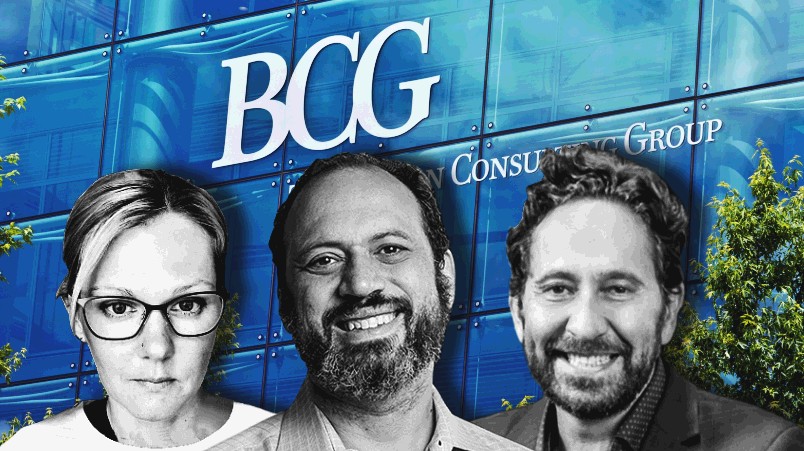
Anna Russell, Ethan Mollick, and Adam Good
Work 25% faster, 40% better: Harvard study finds consulting giant BCG's staff using ChatGPT outperform on every measure – and underachievers get biggest boost
ChatGPT can lift capabilities of worst performers and narrow the gap with high achievers according to a study by Harvard Business School but training is crucial. The study, based on tests at management consulting giant Boston Consulting Group, determined that on every task, staff using GPT significantly outperformed their peers, no matter how performance was measured. The AI-powered group completed 12.2 per cent more tasks on average than their peers, while completing tasks 25.1 per cent faster with 40 per cent higher quality results than those without, per one of the study's authors. Large Language Models (LLMs) like ChatGPT seem to particularly outperform on tasks requiring creativity or innovation – sometimes at the expense of accuracy – but underperform on some simple mathematical or logical exercises.



